UPDATE (5/6/2024) – Thanks to a comment from Jon H., I added information about how “The Life You Save” was originally scheduled to air on March 30, 1980, the day President Ronald Reagan was shot. Due to the attempted assassination of the president and the content of the episode, “The Life You Save” was pre-empted and a rerun of “Cementing Relationships” (09×03) aired instead. Learn more about how the assassination attempt affected M*A*S*H and other television series in a post on mash4077tv.com.
May is a month when I seem to struggle to find an episode to review. There weren’t any Memorial Day episodes of M*A*S*H and the weather can be hit or miss. I decided to take a different approach to see if any episodes of M*A*S*H originally aired in May, and there was one. In the 1970s and 1980s, the traditional television season was typically over by May, but there was an actors’ strike in the summer and fall of 1980 that delayed most of the primetime lineup for the 1980-1981 season. This episode was scheduled to air on March 30, 1981, but it was pre-empted when a shooter attempted to assassinate President Ronald Reagan. The episode was rescheduled for the end of the season. That made “The Life You Save” (09×20) the only M*A*S*H episode to ever premier in May. It first aired on CBS on May 4, 1981, and it was the last episode of the abbreviated ninth season (there were only 20 episodes in the season as opposed to the traditional 24). I have a script for this episode, and it is another copy that belonged to wardrobe director Albert Frankel. These are always my favorite to review, so let’s dig in!
The Script

The copy of the script in my collection is a final draft dated January 30, 1981. This means that production would have pushed into February, which was late and was another consequence of the actors’ strike. “The Life You Save” was written by John Rappaport and Alan Alda. Rapport has 11 total M*A*S*H writing credits, including co-credit for writing “Goodbye, Farewell and Amen.” He also served as one of the show’s producers for the last four seasons. The episode was directed by Alda.
I have written about a number of the scripts that belonged to Frankel in the past, and I have often said they are my favorite. This is true for two reasons: they were the scripts that started my script collection, and the scripts are very detailed. Scripts would have various levels of documentation. Actors’ scripts would have the pages with the dialogue and set directions but that often it. However, members of the production crew needed more information, so their scripts would often include a Call Sheet for each day. This listed each person who was needed on set that day and for which scenes. On the back of the Call Sheet was the Production Requirements which listed everything that was need on set from cameramen, key grips, makeup artist, props, sound, and even coffee. Everyone knew their individual role, so one line on this document would tell them exactly what they needed to do that day. Another common document in scripts was the Shooting Schedule which broke down, day by day, the scenes to be filmed. M*A*S*H filmed an episode over the course of four days, so it was key to be on schedule.
I have a number of scripts in my collection that include Call Sheets and Shooting Schedules, but what is unique to Frankel’s scripts are the costume pages. He kept these pages at the back of the script, but they were integral to his job. He had at least one page for each male actor that appeared in the episode. There were pages for the primary cast and guest cast. The number of each costume needed, for which scenes a costume was needed, on which set, and a detailed description were listed for each costume. In the example (see the slideshow below), the costumes for David Ogden Stiers are broken out by scene. He wore eight costumes throughout, and for each one it lists everything down to the boots and dog tags. It was important to get the details right and have detailed notes in case the scene was filmed over multiple days or had to have reshoots. A costume had to look the same on day one of filming and, if necessary, on day four.
Frankel also paid attention to the set directions in the scripts since they could describe what a character was wearing. He marked up his script in multiple colors of ink. Black ink was used to distinguish breaks between scenes or camera angles, and then red ink was used to underline the names of a character for whom he was responsible. Frankel also received the revised pages as they were released because it could affect his costuming choices. This episode had a fair amount of revised pages, but they were all from the same date of February 3, 1981, and they were all blue. Sadly, unlike some other scripts in the collection, Frankel would throw away the old pages. That was expected, however, as the cover sheet they received with the revised pages instructed them to remove the old pages. Because those are gone, I cannot determine what changed, which is a fun exercise.
The set of Frankel’s scripts in the collection are very special to me. They tell multiple stories, are rich in detail, and offer a unique glimpse into the process of producing an episode of M*A*S*H. For me, however, they are special because they were the first scripts I ever purchased. They introduced me to the idea that I could own something that was once on the set of the show, and that is what sparked the collection. Without the set of 21 scripts that I bought in 2007, there would probably not be a M*A*S*H Historian site today.
The Final Episode
The episode opens with triage in the compound as sniper fire breaks out. Charles and B.J. are saving a patient whose heart has stopped, so they quickly move under a vehicle where they save his life. When the doctors get into the changing room, Charles removes his hat to find that a bullet went through it, narrowly missing his head. He sinks onto a bench before being called into the O.R. by Col. Potter. The near death experience sends him into a tailspin of trying to figure out what death is like. He asks the soldier that he and B.J. saved what it was like to be dead. Charles struggles for answers until he goes to a battalion aid station to help with wounded. He is with a patient as he dies and finds some closure, so he leaves the bullet hole ridden hat at battalion aid as he leaves. With such a heavy primary story, the secondary story involves everyone at the camp changing assignments. Charles is in charge of the motor pool, where he has Rizzo disassemble a Jeep. B.J. is in charge of laundry, Father Mulcahy is in charge of garbage, and Margaret is morale officer. Hawkeye is assigned to the mess tend where he finds that making food isn’t as simple as he thought, and he is stuck with 50 missing trays!
In the later years of M*A*S*H, some fans criticized how dramatic the series became. I don’t agree with assessment for the most part because I feel like that is what allowed the series and the characters to grow over time. It also gave the actors a chance to shine, especially someone with the skills of Stiers. He was so good in this episode. Charles’ near death experience and the need to understand what death was like felt very real. And even though the episode is lighter on comedy, it offered a very human storyline that people in war zones have spoken about struggling with. Death was all around them, and they had to block it out until it was right there in front of them. This episode perfectly illustrates a scenario in which a solider, doctor, nurse, or anyone in a war zone might come close to death and begin to question.
There were a number of minor changes between the script and the final episode. These changes never changed the meaning of the dialogue, but there were some minor word changes here and there. A few scene changes in the episode included a longer scene in which Col. Potter gives out the new job assignments (pages 5 – 6), an additional scene between Charles and Rizzo in the motor pool (page 14), a scene related to B.J.’s poor laundry management that didn’t make it into the episode (page 21), and a longer phone conversation between Col. Potter, Charles, Margaret, and Klinger while Charles was at battalion aid (page 32). I had a few other random observations about the episode. Loretta Swit sounded like she had a cold when the episode was filmed. And the garbage that Hawkeye and Father Mulcahy are pushing back is very green. Who is throwing away fresh lettuce, and why is the garbage so close to the building?!
Rewatching an episode of M*A*S*H and following along with the script is fun and informative, and it is something that I have done countless times. For this episode, however, there was something that struck me. The lines written on the page are just that, lines on a page. It is the job of the actor to bring them to life. The scene in which Charles describes the death of his younger brother is very moving. The pauses in the dialogue and the tone were all up to Stiers. There are no stage directions. There are no instructions of where to pause or where to have a break in his voice. That was all up to Stiers and his delivery (see the photo of page 16 below). The page in the script can only provide so much, then the actor makes character. Stiers was truly a great actor, and this episode allowed him to make Charles more human.
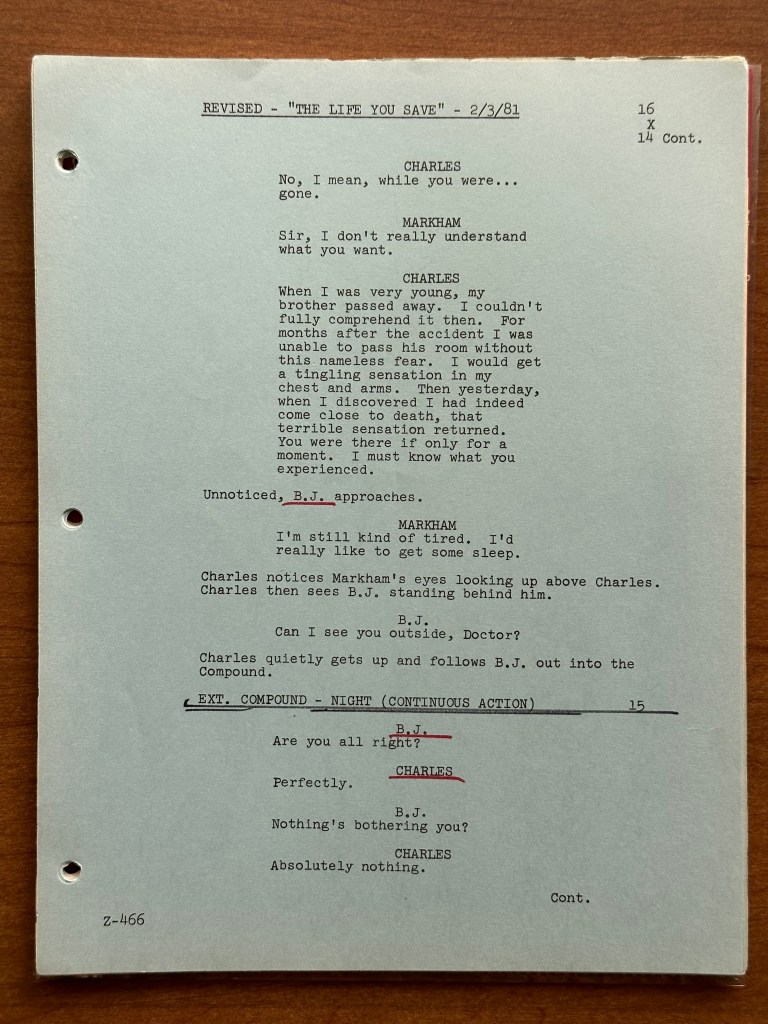

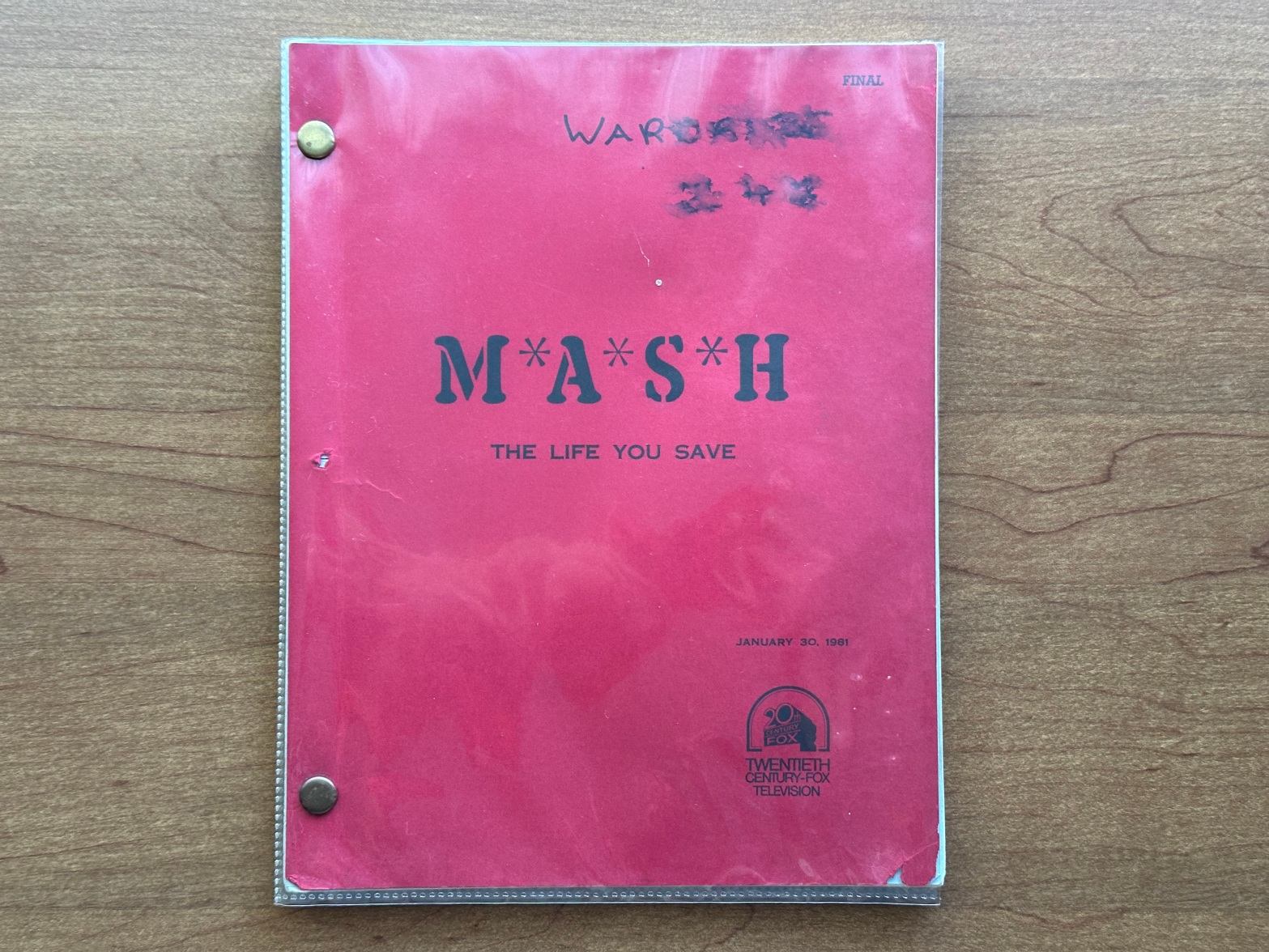












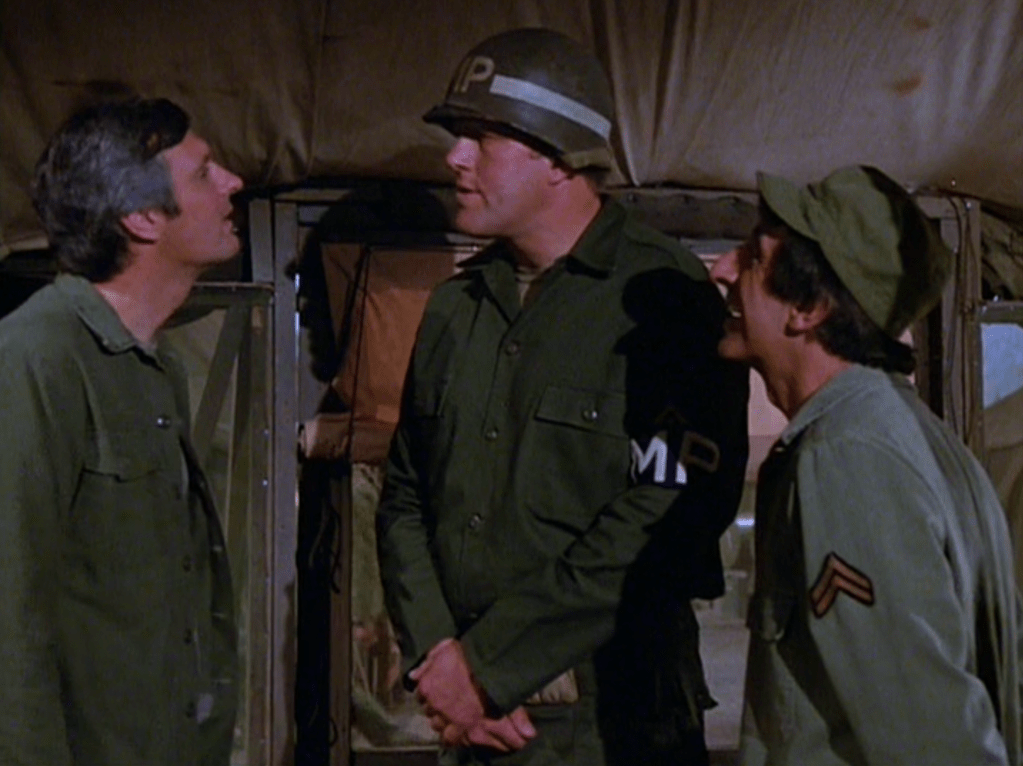


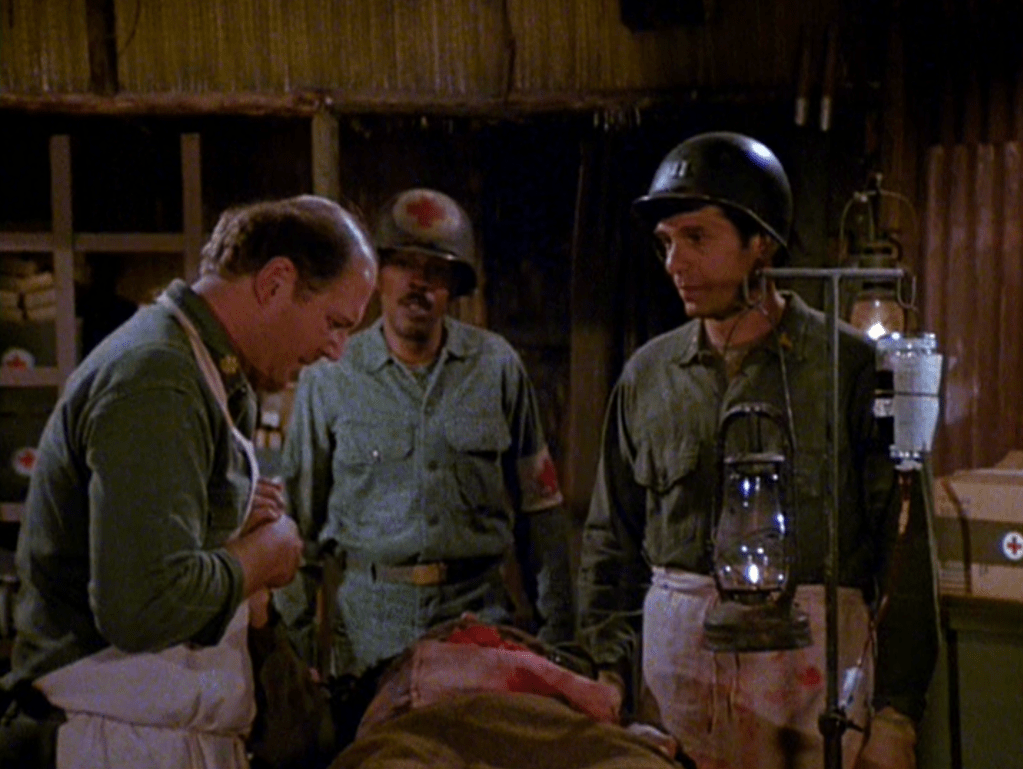
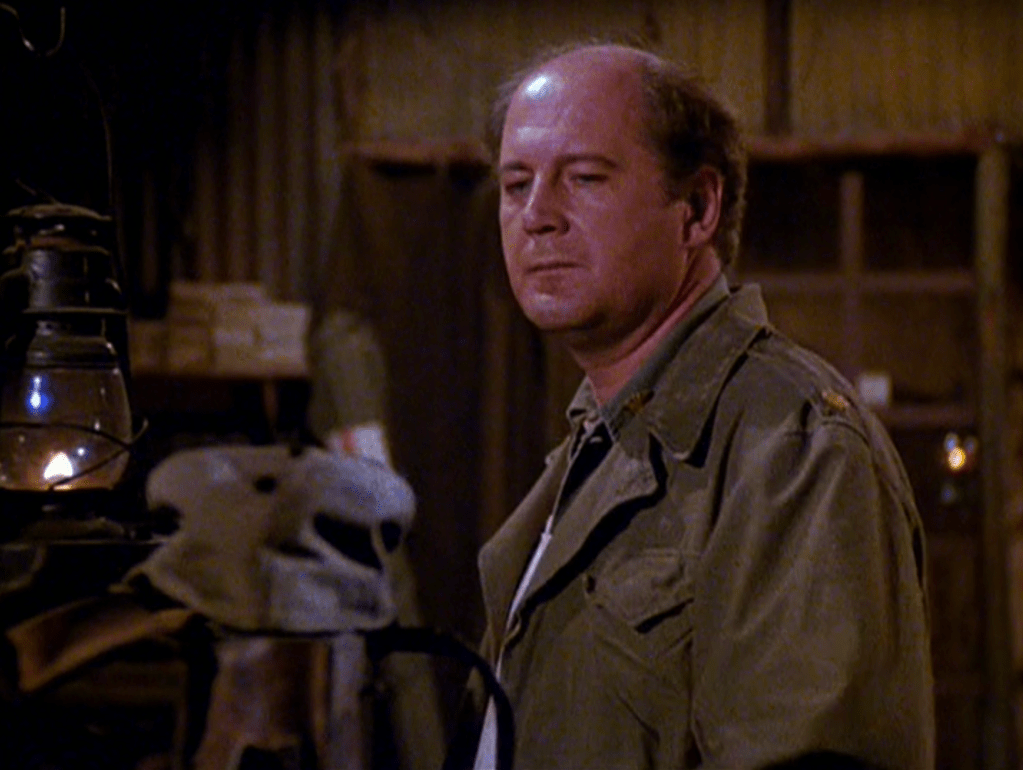
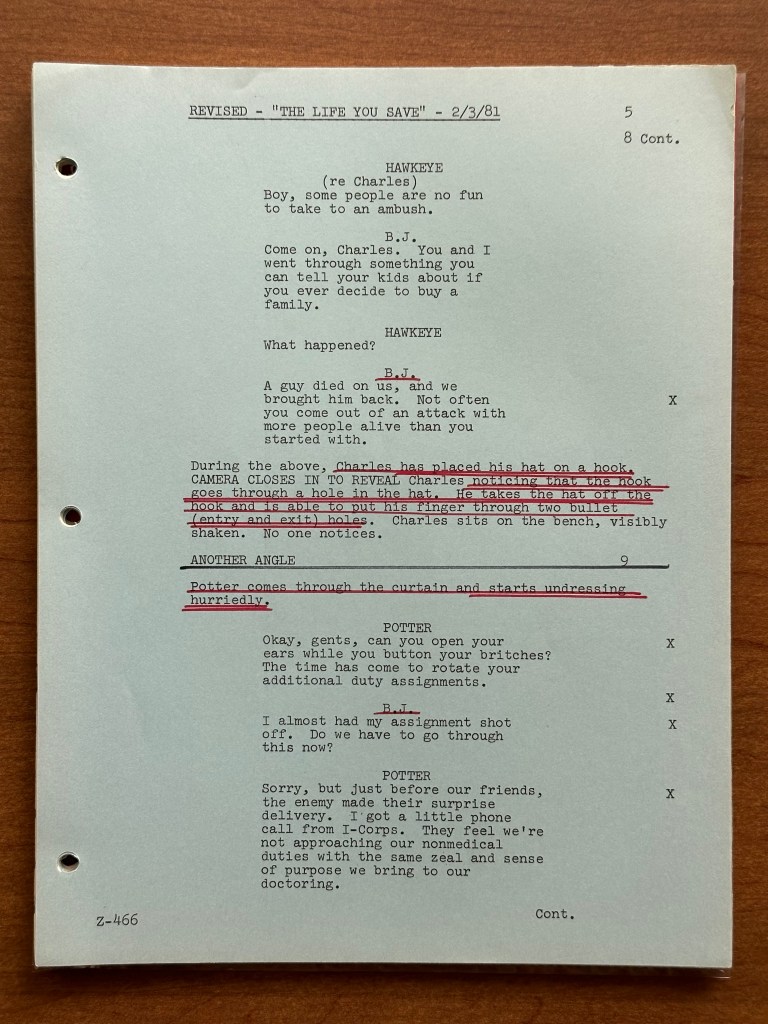
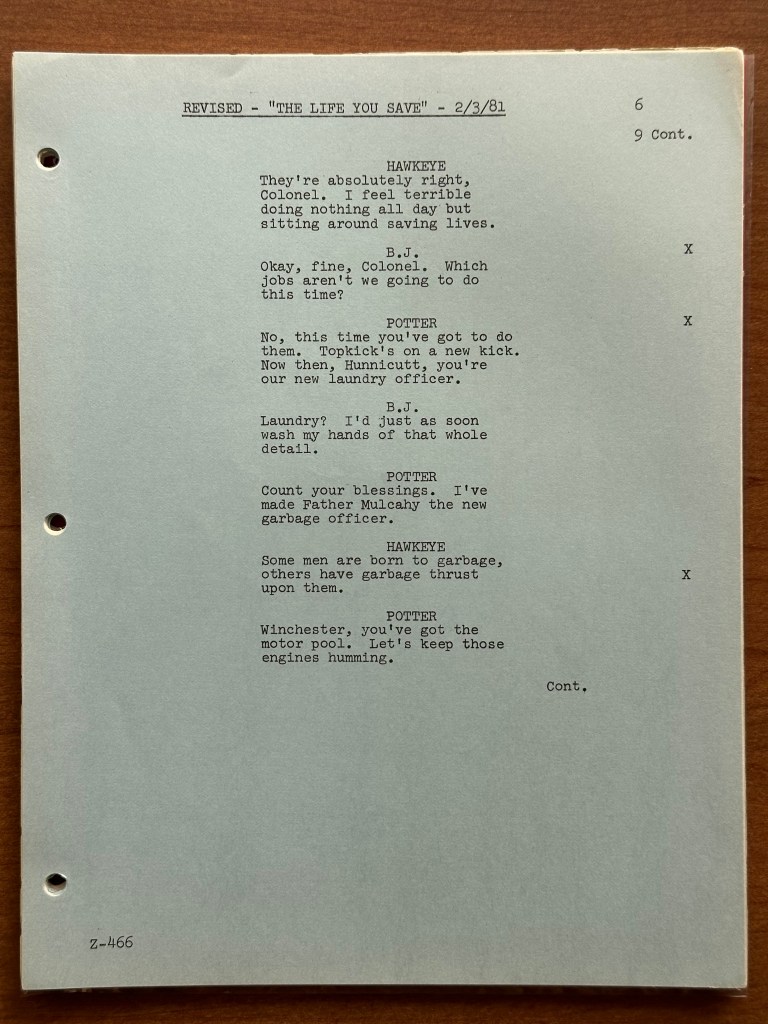
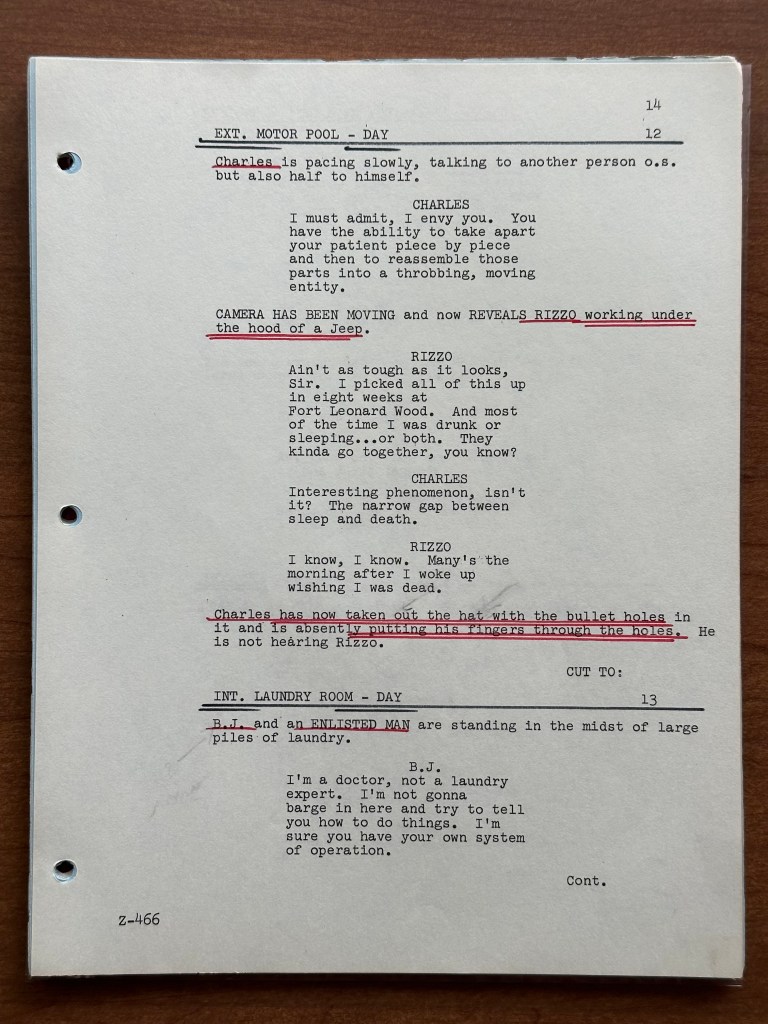


Nice breakdown of the episode. As you mentioned, this was the only new episode originally aired in May of any year. It was originally scheduled by CBS to be aired Mar. 30, 1981, but President Reagan was hit by an assassin’s bullet that day. (I was in high school at the time & remember the news well. He survived fortunately.) Because this episode was related to a gunshot, CBS preempted this episode on Mar. 30 and reran “Cementing Relationships” instead, saving this episode for May 4.
LikeLiked by 1 person
That’s fascinating! I hadn’t heard that before, but it makes sense. The actors strike affected the primetime lineup in the fall, so I assumed that pushed the schedule back. I’ll look into it, and update the post accordingly. Thank you!
LikeLiked by 1 person
Even if “The Life You Save” had aired as scheduled on Mar. 30, the season would’ve run later than normal up to Apr. 13 (“The Foresight Saga”.) The next season, also with a delayed start due to a writers’ strike (“That’s Show Biz” on Oct. 6, 1981) had its finale (“That Darn Kid”) aired Apr. 12 the next year. Both Seasons 9 & 10 had a full season’s episodes (12 hours) produced, and episodes were held over from Season 9 into 10 and Season 10 into 11. There were just 10 episodes produced during Season 11, but of course the last of them (produced near the middle of the season) ran the equivalent of 5 episodes.
LikeLiked by 1 person